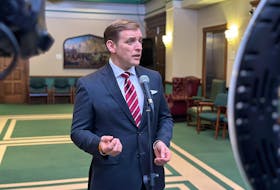By Alison Coffin
The opportunity exists to fundamentally change how we govern this province. To change how we make decisions. How we develop public policy. How we grow as a society.

Provincial public policy can become clearer, more forward-looking, broader in scope, and have greater accountability to, and involvement of, the people. Radical restructuring is not required. Many of the resources already exist. They can be put to better use.
Democracy in Newfoundland and Labrador will improve with the creation of a more rigorous framework for public policy. This is tangible, low-cost and easy to implement. It requires clear communications, long-term planning and a focus on outcomes.
The public accounts, the auditor general’s reports on the audited financial statements, The Economy, and The Economic Review combine to give the most comprehensive, unbiased, non-partisan and factual representation of the provincial economy and fiscal circumstances. The province’s financial statements include a summary of the financial health of Newfoundland and Labrador. The auditor general provides comment on the financial statements and the risks and challenges facing the province. Global economic conditions, a provincial economic overview, detailed sector-specific activity, and the most up-to-date economic indicators are presented in The Economy and The Economic Review.
We know how much we spent on health care and education but do not know if it made us healthier or better educated.
For a complete understanding of the direction and health of the provincial economy and potential effects of public policy, these documents should be read together and in conjunction with other government directives.
The reports are technical in nature, released independently of one another, from different agencies and divisions, at different times, and are often buried deep in departmental news releases. The prominence and promotion of more partisan publications such as budget speeches, news releases and visioning documents further obscure perspectives.
Public input into the political process will improve when citizens have a better understanding of the social, economic and fiscal circumstances of the province. Clarity will come with co-ordination and simplification. The collective findings of these reports can be summarized in plain language, made easily accessible in video and print and incorporated into government’s overall communications strategy in a manner that reflects the importance of the information.
Realistic budgets span more than one year. Spending on hospitals, schools, roads, police and most government activities does not stop every March 31 and then resume on April 1. Continuous or multi-year expenditures are affected by core services, collective agreements, contractual arrangements and infrastructure investments. These expenditures can be predicted years in advance with reasonable certainty.
Multi-year budgets decrease the variability and uncertainty associated with an annual budgeting process and improve fiscal health, operational efficiency, prioritization and transparency. They distinguish between necessary and discretionary spending and track changes in both over time. Boards, agencies and advocacy groups under multi-year funding models have greater freedom to comment on policy and politics without fear of funding cuts.
Government produces strategic plans, activity plans, business plans and annual activity reports. All describe outcomes of their programs and services. Outcomes include measures of a smarter, safer, healthier, better-employed, more democratic society. They represent the desired results of public policy. The community accounts are a database of provincial and community-level information on health, employment, community safety and quality of school life, as well as an interactive measure of well-being called the Better Life Index.
These plans and data are separate and distinct from the annual budgeting process. At no point are the desired outcomes of government activities linked to government spending. Budgets do not include outcomes and plans do not include budgets. We know how much we spent on health care and education but do not know if it made us healthier or better educated. Outcomes can take years and have long-lasting effects, whereas budgets are annual.
The auditor general does identify potential outcomes of policy action or inaction that could impact provincial revenue and expenditure plans and the province’s fiscal circumstances. Our aging population, the volatility of oil and our dependence on it, unfunded pension liabilities, and the potential negative impacts of the Lower Churchill development on taxpayers and ratepayers are consistently identified as long-term risks to the province.
Consider an outcome of low-cost, reliable, green energy for rural areas and an outcome of continued development of energy resources to generate revenue for the province. These outcomes require different, and sometimes competing, policy and budget decisions. The implications of these decisions affect the environment, public health, employment, business activity, and long-term fiscal risk.
Public policy becomes broader in scope and more representative of the people when expenditure and revenue plans include measures of policy outcomes. Multi-year budgets can be linked to the desired results of programs and services. Progress can be measured through the community accounts and the Better Living Index.
Democratic reform happens as political influence on provincial governance is reduced. Minimizing partisan messaging, tracking discretionary spending and tying outcomes to budgets are improvements. Better-informed citizens, elected officials and bureaucrats provide more meaningful input. Multi-year budgets improve clarity and continuity and reduce economic uncertainty. Tracking outcomes makes public policy accountable. This framework enables democratic reform.
About the Author
Alison Coffin (Economics, Memorial University of Newfoundland) is an economist. She has taught at Memorial University, developed policy and strategic plans for the provincial government, and consulted on public policy, pension plans and the provincial budget. Her submission reflects a lifetime of work dedicated to the development of responsible public policy and excellence in governance.









